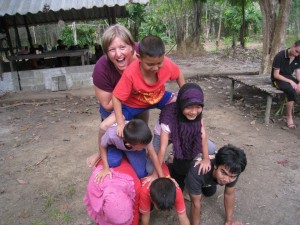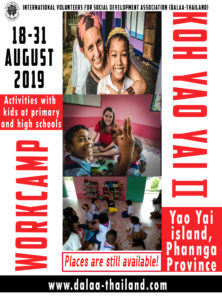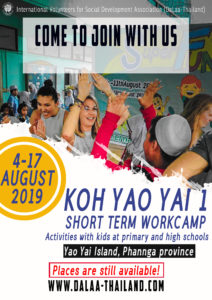DaLaa
Workcamp – code: 6211
COMMUNITY OF MANGROVE FOREST
(construction, creative English teaching activities with children and local
wisdom learning)
SHORT
DESCRIPTION
Sustainability
is challenging to Baan Ta Yang community (Andaman cost-South Thailand),
similarly to the other coastal villages in this area. It is important to
preserve the mangroves, which is natural habitat to flora and fauna, filters
water and protect the land from erosion. The local people are concerned and
take care of the natural environment while keeping traditions and the wisdom of
the elderly. The members of Mangrove Forest Conservation and Community based
Tourism have a construction’s project in building a local pier for the local
uses. Meanwhile, they also would like to continue the concept of non-formal
learning space in the village for children to learn English through creative
activities by international environment.
HISTORY
OF THE PROJECT
Baan
Ta Yang is a Muslim community, not far from the Andaman Sea, located in Pak Nam
sub-district, La-ngu District, Satun Province. Baan Ta Yang is an island community
close to the seawater canals surrounded by mangrove forests. Most villagers
rely on seasonal work in fishing and agricultures especially (nipa
palm/mangrove palm) for daily living and main source of income.
In
February 2014, Dalaa organized the first short-term workcamp at Baan Ta Yang.
The workcamp aims were to create a learning center in the village by organized
English language teaching activities plus local wisdom and culture learning. After
the good feedback from the community they started accepting middle and long
term volunteers from April 2014 onward .We could create and maintain this
learning center during 3 years especially for children but also for adults.
Volunteers were also teaching English at the local schools and sharing the
local life.
In
2015-2016 there was a research about this learning center that helped support
the involvement of the people in community to design their own learning
management. They are now able to value more their local wisdom such as weaving
skills, mangrove forest conservation and community history. Some members of the
local group of conservation of natural resources started new Community based
Tourism activities with the aim to create job opportunities and brings the
visitors caring for nature and villagers wisdom.
They
also created a “Volunteer Band” with teachers of Rebana (Malay tambourines)
from Bulon Island, members of Kuala Bara Band and local people. They spread fun
and happiness by preserve the local folk music ( ‘Rongeng’) and nature caring lyrics.
In
2017, we had to take a break to send DaLaa volunteers because of the main host
personal reasons. However, the motivation of the local people to welcome
international volunteers in the community is still alive and they come up this
year with a new hosting place and people to take care. They would like to bring
the international volunteers activities back to Baan Ta Yang. With this
workcamp, we want to support their motivation for autonomy, environment and
local culture preservation, as well as culture exchange. We want to study the
possibility to start middle and long- term activities there for the future.
AIMS
of the PROJECT
- To support the local group: Mangrove Forest Conservation and Community based Tourism
- To support of the English learning activities (non-formal) and children activities in the community
- To exchange and learn local wisdom and culture with the local community
ACTIVITIES
- Construction of the local pier (concrete and wood) near the center of the Mangrove Forest Conservation and Community based Tourism. Volunteers will support the local team work on the construction (foundation, floor, pillars and roof) (50% of working time) . This pier will be used by local people.
- Organizing creative English teaching activities in the village to the children by games, sports, art, dance, music… (30% of working time)- The place is at Bang Sit’s house (in the village) There are about 20-30 children from elementary school ages. The activities will take the whole day (2-3 days) divided into two sessions from 09:00 -11:30 and 14:00-17:00. It is also possible to have the creative activities in school (when request by teachers).
- Local wisdom learning (20% working time)- possibility to join and learn Thai cooking, discussions on the tourism-based community, mangrove discovery and preservation, making basket, volunteer music band, collecting shells, fishing…
REQUIREMENTS
OF VOLUNTEER
- Flexibility and readiness
in learning new things.
- Respect the differences of
the cultural diversity.
- Able to work with others
people.
- Ready to work with
community.
The
volunteers should be ready to stay in a remote area (near the mangrove forest),
to adapt to the local conditions with only basic facilities.Very few local people
are able to speak in English. Volunteers should be able to handle spontaneous
working environment and constant changes in the plans. The mentality and way of
thinking is very different from the western world. There will have activities
with the children. To have responsibility for you, the kids and full
involvement in community matters is a must. For the 2 weeks, you will be leaded
by a Dalaa member/staff that will help to coordinate the project.
*For ones who plan to travel in Thailand/Asia besides this voluntary work, having it done before or after the project would be advisable. We hope that volunteers will fully spend their stay in the project without asking for a long holiday break amid the workcamp period. This would cause uncertainty in running activities.
FOOD
and ACCOMODATION
Volunteer
will sleep in the host family in the village (the houses are near to each
other). The host family houses are in basic condition. You will need to bring
your sleeping bag, pillow and a small mattress. The toilets and bathroom are in
Thai style with very basic condition. The
volunteers only sleep in different places but will come to the same meeting place
for cooking and others activities. Do not worry about the distances; the places
are just near to each other (walking distance). The volunteers will take turn
in a small group to cook in the shared kitchen. Besides, the volunteers will
also have chance to get invited to eat at the villagers houses or sometimes the
villagers brings foods (potluck system) to eat with the volunteers. Volunteers
are welcome to cook their own food using the ingredients available there. (No
oven, only a gas and woks or pans). If you plan to cook something typical from
your home country, instant ingredients (Halal) are recommended to bring from
home.
**Villagers
of Baan Ta Yang are Muslim so there is no pork or alcohol in the village.
OTHER
PRACTICAL INFORMATION
- Laundry: expect to hand-wash your clothes
- Water supply and electricity: available
- Internet/phone access: there is connection for DTAC and True move phone companies’ network. You can use internet with Thai Sim card and your mobile phone. But it is important to be ready to leave with little or no internet during your stay there.
- La-ngu, is a town at 10km, where there is an hospital, clinics and pharmacies.
- Hat Yai, the main city of South Thailand (close to DaLaa office) is 2 hours by bus/mini bus from La-ngu.
- Clothes worn in the village: You will be living in an area with elderly people and children around so it is appropriate that you dress modestly, for example no short skirts or shorts too far above the knees. Also women should wear tops that cover your shoulders. Bikini is not appropriate to swim. Please wear a short and a top instead. You will learn more about Thai culture at the introduction day so please don’t worry too much. You will quickly learn when it best to dress more informally and when it is important to cover up
- Language: only very few people in the village can speak English. We will teach you some basic Thai language during the start of the workcamp and of course you will have the whole 2 weeks to practice your Thai among the volunteers and local people in the community. Non-verbal communication is always helpful.
- You are given 1 or 2 free
day(s) during the 2 weeks and plenty of free time in the evening that can be
spent on daily meeting or building group dynamic by playing various games,
having discussion and recreation activities. Personal expenditure on camp
holiday is covered by volunteers themselves.



